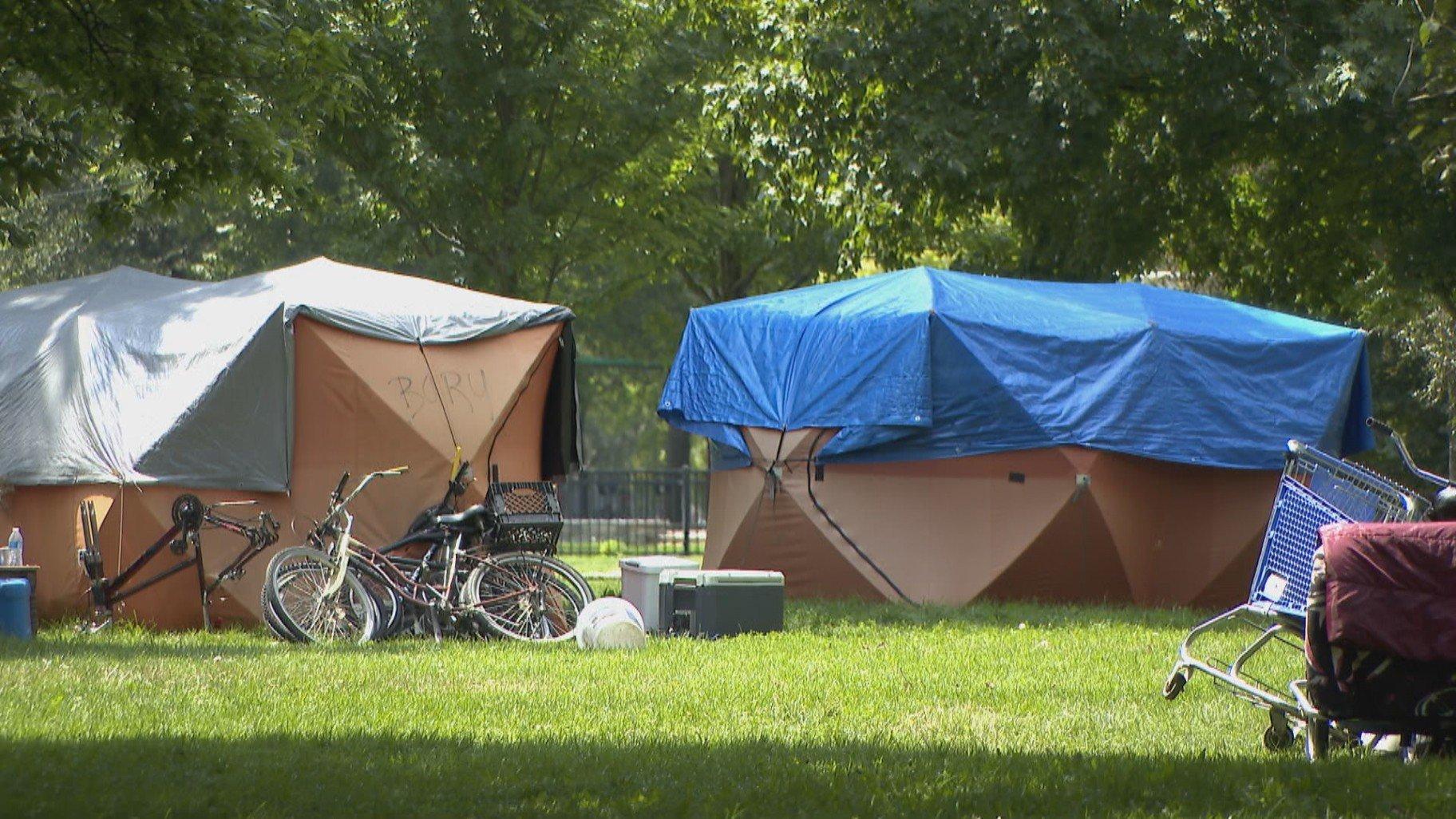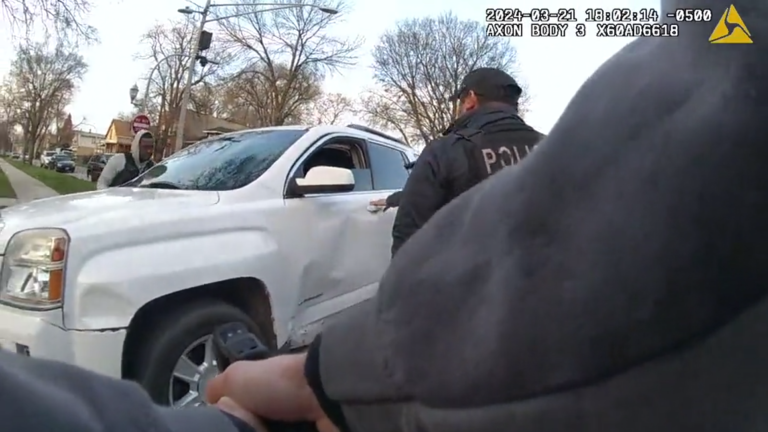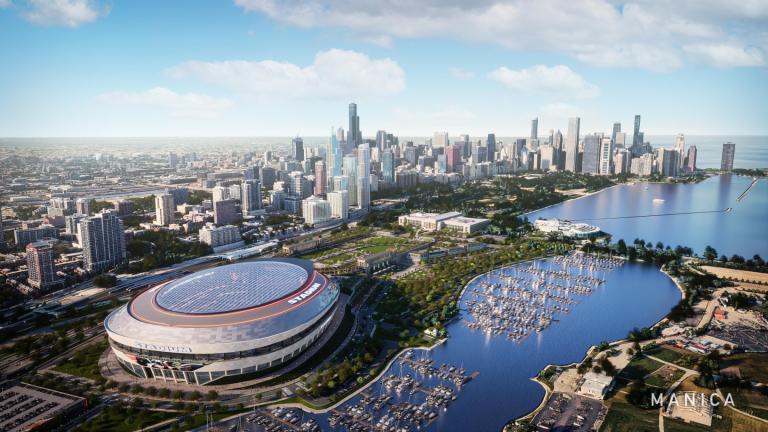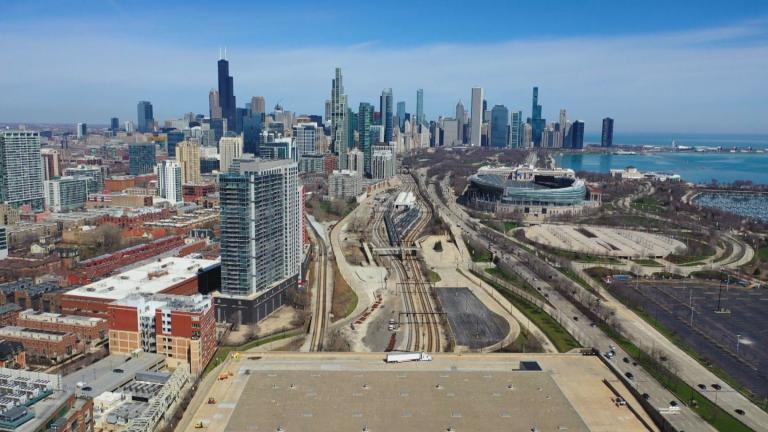 A homeless encampment in Humboldt Park. (WTTW News)
A homeless encampment in Humboldt Park. (WTTW News)
Mayor Brandon Johnson formally asked the Chicago City Council on Thursday to put the decision of whether to hike taxes on the sales of properties worth $1 million or more to fight homelessness in the hands of voters, capping a years-long effort to confront the growing number of unhoused Chicagoans.
Despite the enthusiasm of supporters who held a City Hall rally before the City Council meeting and packed the chambers, Ald. Brendan Reilly (42nd Ward) tried, but failed, to prevent it from heading directly to a committee hearing and vote.
Johnson said after the City Council meeting he was very confident the City Council would put the proposal to voters during the March 2024 primary.
Supporters of the plan were prepared to call a special City Council next week to prevent the measure from even being temporarily derailed, but will not have to do so, said Ald. Carlos Ramirez-Rosa (35th Ward), Johnson's floor leader.
The proposal, known as Bring Chicago Home, would slash the real estate transfer tax paid by Chicagoans who sell residential and commercial properties for less than $1 million by 20%, while hiking taxes on transactions of more than $1 million by as much as 400%.
That would generate approximately $100 million annually, which supporters say would be enough to address the root causes of homelessness by building new permanent housing that offers wraparound services like substance abuse counseling, supporters say, in an effort to combat crime and poverty throughout Chicago.
An August report from the Chicago Coalition of the Homeless, a member of the coalition that crafted the Bring Chicago Home proposal, found that the number of Chicagoans who do not have a permanent home grew 4% between 2020 and 2021 to 68,440 people.
State law does not give the City Council the power to change the transfer tax on its own authority. Without legislation passed by the General Assembly and signed by the governor, the measure needs the support of Chicago voters through a referendum before the City Council can levy the tax and collect the funds.
Under the current law, the buyer of a home worth $300,000 pays the same flat transfer tax as the buyer of a multimillion-dollar mansion or downtown skyscraper — a fact that supporters of the change contend is unfair. The initial proposal considered by alderpeople at a hearing in July would have hiked the transfer tax on the sale of all properties by the same amount, generating $60 million more than the revised proposal.
The seller of a home sold for $500,000 now pays $3,750 in real estate transfer taxes, a 0.75% tax rate. If voters pass the binding referendum set to be on the March 2024 primary ballot, and the City Council agrees to levy the tax, that cost would drop to $3,000, or a 0.60% tax rate, officials said.
Nearly 94% of all properties sold in Chicago have a final purchase price of less than $1 million, officials said.
The transfer tax on properties sold for more than $1 million would spike by 233% percent, but apply to just to the amount of the sale greater than $1 million, in an effort to ensure the measure withstands a legal challenge and reduces the incentive for sellers to artificially lower sale prices.
For example, the seller of a property that sells for $1.2 million now pays $9,000 in transfer taxes. Under the revised proposal, that would rise to $10,000, with the higher tax rate of 2% applied to just $200,000 of the sale price.
Using the same mechanism, the transfer tax on properties sold for more than $1.5 million would spike by 400% with the increase only applying to the amount of the sale greater than $1.5 million.
Imposing a marginal tax, rather than a flat tax, would make the tax fairer, and ease the tax burden on two- to six-unit properties, both residential and commercial, supporters said.
The revised proposal would exempt developments subsidized to be affordable, according to the proposal.
Despite the changes, the debate over whether to hike the real estate transfer tax is expected to be fierce, as leaders of business and real estate groups warn it could cause the city’s already-struggling commercial real estate market to collapse amid the shift to remote work.
Contact Heather Cherone: @HeatherCherone | (773) 569-1863 | [email protected]








